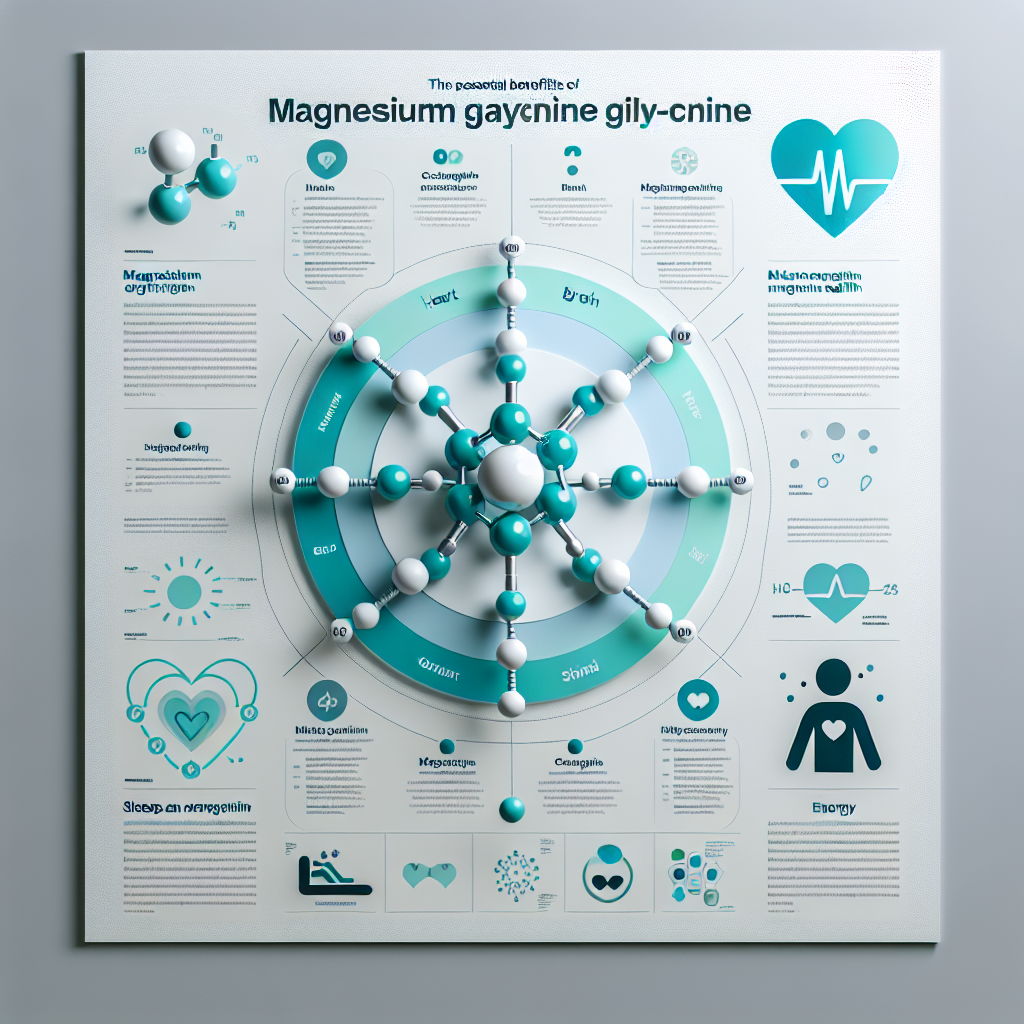The Benefits of Magnesium Glycinate for Sleep
Understanding the Importance of Quality Sleep
In today’s fast-paced world, quality sleep often takes a back seat to our busy lives. Yet, it is one of the most important aspects of maintaining good health. Without adequate sleep, our bodies can’t perform necessary repairs, our brains can’t process memories effectively, and our mood can take a serious hit.
From my experience, as someone who used to struggle with insomnia, I can tell you that finding a solution felt like winning the lottery. Magnesium Glycinate came to my rescue, improving not just the quantity but also the quality of my sleep.
Quality sleep lowers stress levels, boosts the immune system, and even helps in weight regulation. That’s why understanding the benefits of Magnesium Glycinate for sleep might just be the key to unlocking a healthier you.
How Magnesium Glycinate Improves Sleep
Magnesium Glycinate is a chelated form of magnesium, bound to the amino acid glycine. This combo helps the body relax by impacting neurotransmitters in the brain, promoting a sense of calm. It’s like a natural relaxant that gets your body and mind ready for some good-quality Zs.
I remember reading up on how stress hormones like cortisol could totally mess up your sleep cycle. Magnesium Glycinate helps regulate these hormones, effectively reducing the roadblocks to restful sleep.
When I first started taking it, I noticed a difference in just a week. I went from tossing and turning to actually getting a solid 8 hours of sleep. My energy levels during the day improved, and I felt so much better overall. It was like I had found a restful sleep secret weapon.
My Personal Sleep Routine with Magnesium Glycinate
Every night, I take my magnesium glycinate supplement about an hour before bed. Pairing it with a good book or some light stretching, it has become a part of my bedtime routine. These small steps together make a huge difference in my sleep quality.
In addition to the supplement, I also dim the lights and set up a calming environment. It’s like creating a sleep sanctuary. All these combined efforts have a cumulative effect in enhancing my sleep quality.
I’d recommend trying Magnesium Glycinate if sleep is an issue for you. You’d be surprised how this little supplement can bring about such a big change. Just remember, consistency is key here. Make it a part of your routine, and good sleep will follow.
How Magnesium Glycinate Enhances Muscle Recovery
Muscle Recovery: Why It’s Important
For anyone into fitness, muscle recovery isn’t just optional. It’s a necessity. Your muscles need time to repair and grow stronger after an intense workout. If you skip this crucial phase, you’re looking at slower progress and an increased risk of injuries.
I can’t tell you the number of times I ignored muscle recovery in my earlier fitness journey. The result? Constant soreness and absolutely no gains. Learning about the importance of recovery was an absolute game-changer for me.
Muscle recovery helps in reducing fatigue, improves performance, and actually allows you to train more effectively. It makes a world of difference in your fitness journey, and Magnesium Glycinate can play a key role in that process.
The Role of Magnesium in Muscle Recovery
Magnesium is known to play several roles in muscle function, including muscle contraction and relaxation. Without sufficient magnesium, your muscles can cramp and fatigue more easily. This is where Magnesium Glycinate really shines.
When you supplement with Magnesium Glycinate, you’re providing your muscles with the essential nutrients they need to function optimally. My post-workout soreness reduced significantly once I started using it. Faster recovery meant I could get back to my workouts sooner, without the dragging fatigue.
It also helps regulate potassium and calcium levels, which are essential for muscle contraction and relaxation. Having a balanced electrolyte level helps in efficient muscle function, reducing the risk of cramps and strains.
My Experience with Magnesium Glycinate in Muscle Recovery
After discovering the benefits of Magnesium Glycinate for muscle recovery, I incorporated it into my post-workout regimen. Let me tell you, the difference was almost immediate. My muscles felt less fatigued, and I could push myself harder in subsequent workouts.
Pairing Magnesium Glycinate with a protein shake right after a workout has been my go-to strategy. This combo has helped me increase my strength and endurance over time. I recover faster, allowing me to train consistently without the downtime that comes with excessive soreness.
Honestly, if you’re serious about your fitness and recovery, this is one supplement you should consider adding to your routine. It has certainly made a huge difference in mine.
The Role of Magnesium Glycinate in Anxiety Reduction
Understanding Anxiety and Its Impact on Life
Anxiety isn’t just a feeling of being on edge; it’s a condition that can severely impact the quality of life. From sleepless nights to constant worry, anxiety can create a cycle that is hard to break out of. It’s not just about feeling anxious before a big event; it can strike at any moment.
I’ve had my own battles with anxiety, and let me tell you, it can be crippling. The constant worry, the never-ending cycle of what-ifs, was exhausting. It wasn’t until I started looking for natural ways to manage my anxiety that I discovered Magnesium Glycinate.
Knowing that lifestyle changes, including supplementation, could make a difference was a big relief. And let me assure you, Magnesium Glycinate has been a game-changer in managing my anxiety levels.
How Magnesium Glycinate Helps Reduce Anxiety
Magnesium plays a crucial role in regulating neurotransmitters that send messages throughout your brain and body. An imbalance in these chemicals can lead to anxiety symptoms, and here’s where Magnesium Glycinate comes into play.
By helping balance out these neurotransmitters, Magnesium Glycinate has a calming effect on the brain. I noticed that taking it consistently helped reduce my overall anxiety levels. I was less jittery and more focused.
It also helps regulate cortisol, the stress hormone. High cortisol levels can induce stress and anxiety, and Magnesium Glycinate helps keep those levels in check. This natural balancing act can be incredibly beneficial for anyone dealing with anxiety.
Incorporating Magnesium Glycinate into My Daily Routine
When it comes to anxiety, consistency is crucial. I incorporated Magnesium Glycinate into my daily routine, taking it at the same time each day. Paired with mindfulness practices like yoga and meditation, the effects have been nothing short of remarkable.
I also made other lifestyle changes, like reducing caffeine and making sure to get enough sleep. These changes, combined with Magnesium Glycinate, helped me approach my day more calmly and with a clear head.
If you’re struggling with anxiety, I’d highly recommend giving Magnesium Glycinate a try. It’s a natural option that could make a big difference in your mental well-being. Also, consult with a healthcare provider to make sure it’s the right choice for you.
Magnesium Glycinate for Better Cognitive Function
The Importance of Cognitive Health
Cognitive function includes processes like memory, attention, and problem-solving. As we age, it’s natural for cognitive abilities to decline, but that doesn’t mean there’s nothing we can do about it. Maintaining a good diet, staying physically active, and adding the right supplements can all contribute positively.
I first became interested in cognitive health when I noticed slight memory lapses—like forgetting where I put my keys or struggling to remember names. That’s when I started researching ways to keep my brain sharp, and Magnesium Glycinate kept popping up as a beneficial supplement.
Understanding that cognitive health is just as important as physical health made me more proactive in taking steps to support it. And Magnesium Glycinate was one of those steps.
How Magnesium Glycinate Supports Cognitive Function
Magnesium has a profound impact on brain function and mood. It contributes to synaptic plasticity, which is the ability of synapses to strengthen or weaken over time, depending on activity levels. Simply put, this helps your brain adapt and learn new information more efficiently.
Additionally, Magnesium Glycinate helps regulate calcium influx in neurons, preventing overstimulation which can damage brain cells. This regulation is crucial for cognitive functions like memory and attention.
After a few months of taking Magnesium Glycinate, I noticed improvements in my focus and memory. I felt more alert and capable of tackling complex tasks at work. The difference was subtle but undeniable.
Practical Tips for Enhancing Cognitive Health
Adding Magnesium Glycinate to your daily routine is a great start, but there are other ways to support cognitive health. Engaging in regular physical activity is known to boost brain power, as is staying mentally active by learning new skills or hobbies.
A balanced diet rich in omega-3 fatty acids, antioxidants, and vitamins also supports brain health. Combining these lifestyle habits with Magnesium Glycinate creates a holistic approach to cognitive well-being.
I’ve found that keeping a consistent routine—incorporating these habits along with my Magnesium Glycinate supplementation—has made a noticeable difference in my cognitive function. It’s about creating a balance that works for your lifestyle and needs.
Check out the newly launched brand, Master Nutritional – Master Magnesium Glycinate.
FAQs about Magnesium Glycinate
What is Magnesium Glycinate?
Magnesium Glycinate is a chelated form of magnesium, meaning it is bound to the amino acid glycine. This form is known for its high absorption rate and gentle effect on the stomach, making it a preferred option for those looking to supplement magnesium.
Is Magnesium Glycinate safe to take daily?
Yes, Magnesium Glycinate is generally considered safe for daily use, but it’s always best to consult with a healthcare provider before starting any new supplement to ensure it’s appropriate for your individual health needs.
How long does it take to see the benefits of Magnesium Glycinate?
The benefits of Magnesium Glycinate can vary depending on individual health conditions and reasons for use. However, many people report noticing improvements in sleep, anxiety, muscle recovery, and cognitive function within a few weeks of consistent use.
Can Magnesium Glycinate help with insomnia?
Yes, Magnesium Glycinate can help with insomnia by promoting restful sleep through its calming effect on the nervous system. It helps regulate neurotransmitters that play a key role in sleep and relaxation.



